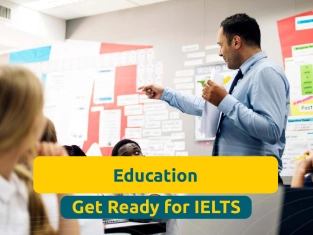by PushtoLearn
Work
Table of Contents
Work Flashcards - Vocabulary Practice for IELTS
These exercises focus on Work Vocabulary
List of Work Words for the IELTS
|
Word/Phrase |
Definition |
Example |
|
Involve |
To include as a necessary part or result. |
The job involves working long hours in the open air. |
|
Employment |
The condition of having a paid job. |
Employment opportunities have increased in the tech sector. |
|
In the Open Air |
Outside; in an outdoor environment. |
She prefers jobs that allow her to work in the open air. |
|
Enjoyment |
The state of deriving pleasure from something. |
He finds great enjoyment in solving workplace problems. |
|
Association |
A connection or relationship between things. |
His association with the company lasted five years. |
|
Fulfilment |
A sense of satisfaction from achieving goals. |
Job fulfilment is a key factor in long-term employment. |
|
Occupation |
A person’s job or profession. |
Teaching is a rewarding occupation for many people. |
|
Join |
To become a member or participant. |
He decided to join a trade union to protect his rights. |
|
Trucks Deliver |
Vehicles transport goods to specific locations. |
Trucks deliver supplies to remote areas daily. |
|
Supply |
To provide or make available. |
The company supplies building materials to contractors. |
|
Ambition |
A strong desire to achieve something. |
Her ambition is to become the CEO of a major corporation. |
|
Earn Living Through Trade |
To make money by engaging in commerce. |
Many families earn their living through trade in rural areas. |
|
Look After |
To take care of someone or something. |
He was hired to look after the company’s finances. |
|
Accepted For |
Approved or allowed entry. |
She was accepted for a role in a leading tech company. |
|
Interested In |
Showing curiosity or concern about something. |
He is interested in exploring opportunities in marketing. |
|
Avoid Trouble |
To steer clear of issues or conflicts. |
Employees should follow rules to avoid trouble at work. |
|
Working with the Public |
Interacting directly with customers or clients. |
Jobs working with the public require excellent communication skills. |
|
Available For |
Ready or accessible for use. |
The position is available for immediate start. |
|
Financial Rewards |
Monetary compensation for work. |
The job offers excellent financial rewards and benefits. |
|
Protect |
To keep safe from harm or damage. |
The union aims to protect the rights of employees. |
|
Point of View |
A perspective or opinion on a subject. |
From the employer’s point of view, punctuality is crucial. |
|
In Your Opinion |
Asking someone’s viewpoint. |
In your opinion, what makes a job fulfilling? |
|
Issue |
A problem or matter requiring attention. |
Workplace stress is a common issue for employees. |
|
Graduate with Honours |
Completing a degree with high academic achievement. |
She graduated with honours in business management. |
|
Pros and Cons |
The advantages and disadvantages of something. |
We need to weigh the pros and cons before accepting the job offer. |
|
Let Me See |
A phrase used to pause and think. |
Let me see, I think the best option is the first one. |
|
I Guess That |
A casual way of giving an opinion. |
I guess that the meeting will finish by 3 PM. |
|
Satellite |
A device or object that orbits a planet. |
Communication through satellite is essential for global trade. |
|
Broadband |
High-speed internet access. |
Many employees rely on broadband for remote work. |
|
Transfer |
To move from one place or position to another. |
She requested a transfer to a different department. |
|
Consumer |
A person who purchases goods or services. |
Companies must understand the needs of their consumers. |
|
Access |
The ability to enter or use something. |
Employees have access to online training resources. |
|
Speedy |
Fast or quick. |
The project required speedy communication between teams. |
|
Handy |
Convenient or useful. |
The new software is very handy for managing schedules. |
|
Commercial |
Related to business or trade. |
The commercial success of the product exceeded expectations. |
|
Periodical |
A magazine or journal published regularly. |
She subscribes to a business periodical to stay informed. |
|
Exchange |
To give and receive something in return. |
Employees often exchange ideas during meetings. |
|
Provide |
To make available or supply something. |
The company provides free health insurance to its staff. |
|
Sample |
A small part used to represent the whole. |
The sample survey showed high employee satisfaction. |
|
Be Able To |
To have the ability to do something. |
He is able to handle multiple tasks efficiently. |
|
Verbal Communication |
Expressing ideas through spoken words. |
Effective verbal communication is essential for team collaboration. |
|
Non-Verbal Communication |
Conveying messages through body language or gestures. |
Non-verbal communication, like eye contact, plays a key role in interviews. |
|
Receiver |
The person who gets the message or information. |
The receiver interpreted the manager’s instructions accurately. |
|
Message Clues |
Hints or indications about the meaning of a message. |
Facial expressions can provide message clues during conversations. |
|
Decode |
To interpret or understand the meaning. |
Employees must decode customer feedback to improve service. |
|
Gesture |
A movement used to express an idea or feeling. |
A simple gesture of appreciation can boost morale. |
|
Body Language |
Non-verbal cues expressed through posture or movement. |
Positive body language creates a good impression during meetings. |
|
Eye Contact |
Direct visual connection with another person. |
Maintaining eye contact shows confidence in an interview. |
|
Facial Expressions |
Movements of the face to convey emotions. |
Her facial expressions revealed her enthusiasm for the project. |
|
Participant |
Someone who takes part in an activity. |
Each participant contributed valuable ideas to the discussion. |
|
Layout |
The arrangement or design of something. |
The office layout was designed to promote collaboration. |
|
Annual |
Occurring once a year. |
The company holds an annual meeting to review progress. |
|
Take Into Account |
To consider something when making a decision. |
We must take into account the potential risks of expansion. |
|
Requirement |
A necessary condition or need. |
Meeting deadlines is a key requirement for this job. |
|
Relatively |
To a certain degree or in comparison to others. |
The cost of living in the area is relatively low. |
|
Obvious |
Easily perceived or understood. |
The benefits of teamwork are obvious in most projects. |
|
Carry Out |
To execute or perform a task. |
The team carried out a survey to assess employee satisfaction. |
|
Summarize |
To briefly state the main points. |
He was asked to summarize the findings of the report. |
|
Draw Out |
To extend or lengthen something. |
The speaker managed to draw out the discussion for another hour. |
|
Trade Union Officials |
Representatives of worker organizations. |
Trade union officials negotiate better working conditions for employees. |
|
Diverse |
Showing variety or differences. |
The company has a diverse workforce from various backgrounds. |
|
Engage |
To participate or involve oneself. |
The workshop aims to engage employees in professional development. |
|
Informal Small Talk |
Casual conversation about non-serious topics. |
Informal small talk helps build rapport in the workplace. |
|
Agenda |
A list of items to be discussed in a meeting. |
The meeting agenda includes budget planning and staff updates. |

Usage in IELTS Exam Formats
Reading Section
-
Words like requirement, agenda, and financial rewards often appear in passages about employment trends or workplace issues.
Listening Section
-
Terms such as engage, employee, verbal communication, and prevent conflict are common in audio related to workplace scenarios.
Writing Section
-
Use phrases like pros and cons, take into account, obvious, and carry out to enhance essays about work-related topics.
-
Example: “The pros and cons of remote work must be carefully taken into account before implementation.”
Speaking Section
-
Employ terms like employee, look after, verbal communication, and fulfilment when discussing job preferences or workplace experiences.
Common Mistakes
-
Confusing "Employee" and "Employer":
-
Mistake: "The employer works under the manager."
-
Correction: "The employee works under the manager."
-
Mixing "Verbal" and "Non-Verbal Communication":
-
Mistake: "Eye contact is verbal communication."
-
Correction: "Eye contact is non-verbal communication."
-
Overusing "Engage" Without Context:
-
Mistake: "The meeting was engaged with all participants."
-
Correction: "The meeting engaged all participants in meaningful discussions."
-
Using "Annual" for Daily Events:
-
Mistake: "We have an annual meeting every day."
-
Correction: "We have a daily meeting to discuss progress."
-
Misusing "Take Into Account" Without Action:
-
Mistake: "We must take into account, but no decisions were made."
-
Correction: "We must take into account all factors before making a decision."
FAQ
What is the difference between "employee" and "employer"?
An employee works for a company, while an employer is the person or organization that hires and pays them.
How is "verbal communication" different from "non-verbal communication"?
Verbal communication involves spoken words, while non-verbal communication includes gestures, body language, and facial expressions.
Why is "engage" important in workplace discussions?
It highlights participation, e.g., “Employees who engage in meetings contribute to better outcomes.”
Can "agenda" be used in casual settings?
Yes, but it’s more common in formal contexts like meetings or conferences.

